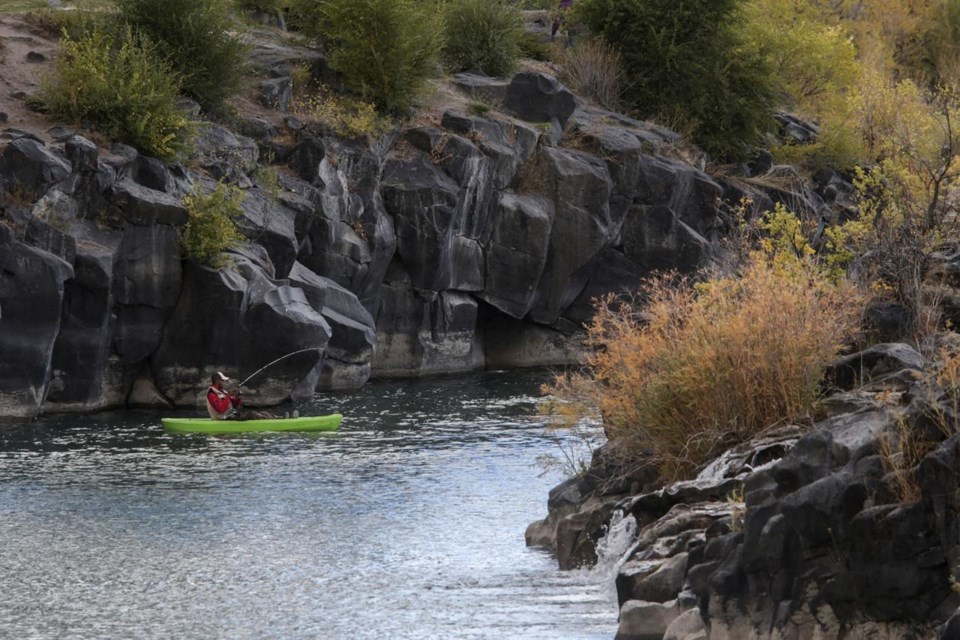BOISE, Idaho (AP) — Idaho has joined a Texas lawsuit against the Biden administration's waterway protections, claiming the rules are too vague and violate state sovereignty rights.
The lawsuit, originally filed in southern Texas' federal courts Jan. 18, was amended to include Idaho on Monday. In it, Texas Attorney General Ken Paxton and Idaho Attorney General Raúl Labrador contend that a new interpretation of a Clean Water Act rule is too vague, oversteps the bounds of federal authority and puts the liberties of states and private property owners at risk.
The federal rule was finalized by President Joe Biden's administration in December. It defines which “waters of the United States” — often called “WOTUS” — qualify for protection under the Clean Water Act. The change repeals a Trump-era rule and expands some water pollution protections to thousands of small streams, wetlands and other waterways.
Roughly half of the U.S. is taking part in lawsuits challenging the rule. Twenty-four states joined in a lawsuit filed in North Dakota's federal courts earlier this month, making largely the same arguments against the WOTUS rule as those being made in the Texas case.
Some Idaho agency officials and leaders have expressed surprise at Labrador’s decision to join the Texas lawsuit, rather than the larger 24-state effort — in part because his office never touched base with them on the matter until after both lawsuits had been filed. Historically, the attorney general’s office has looped in state agencies when relevant litigation efforts are in the works.
Emails obtained by The Associated Press through a public record request showed those officials expressing dismay that they weren't notified that either lawsuit was in the works by the Idaho attorney general's office. Republican Idaho Gov. Brad Little, who had worked with many of the governors from the 24-state lawsuit in writing a letter to Biden opposing the WOTUS rule, only learned about the larger lawsuit when he saw a press release from another state, Little's spokesperson said last week.
On Tuesday, Labrador's spokeswoman Beth Cahill said the attorney general's legal team decided the Texas suit was the better choice because having just two states listed as plaintiffs would allow Idaho's interests to be “front-and-center.”
Cahill also noted Texas was the first to file suit against the Biden administration’s interpretation of the WOTUS rule, and that Texas has experience fighting an earlier version of the rule released under the Obama administration. She also said the federal judge handling the case has handled complex environmental cases in the past.
The states bringing both of the lawsuits brought in Texas and North Dakota make similar arguments against the rule, claiming that the Environmental Protection Agency and U.S. Army Corps of Engineers overstepped their authority and jurisdiction by trying to encompass more waters than allowed in the Clean Water Act. Both lawsuits argue that the new rule is vague, arbitrary and capricious, and that it would unduly burden property owners, placing them at risk of criminal or civil penalties if they fail to correctly guess which waters on their land fall under the Clean Water Act.
Both lawsuits ask their respective courts to find the rule unlawful and vacate it.
The federal agencies have not yet responded to the lawsuits. The states in both federal cases have asked their respected judges to put the federal rules on hold while the lawsuits move forward.
Exactly which wetlands are protected by the Clean Water Act is a question that has already been raised in a long-running dispute between a northern Idaho couple and the EPA. The U.S. Supreme Court heard arguments in the lawsuit brought by Chantell and Michael Sackett last year, and the ruling could determine the reach of the Clean Water Act on private property.
The Sacketts purchased their property near Priest Lake in 2005, and they decided to start building a home here in 2007. They had filled part of the property — described by supporters as “soggy ground” and described by the EPA as a wetlands — with rocks and soil in preparation for construction. But federal officials ordered the work halted, and the case has bounced around the courts for years.
Rebecca Boone, The Associated Press



